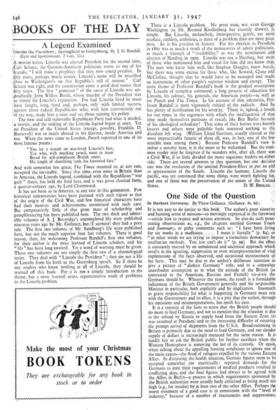-BOOKS OF THE DAY
A Legend Examined
14incoln the President: Springfield to Gettysburg. By J. G. Randall: f.! (Eyre and Spottiswoode. 2 Vols. 32s.) MONTH before Lincoln was elected President for the second time, 'earl Schurz, the German-American politician, wrote to one of his " I will make a prophecy that may now sound peculiar. In
• fifty years, perhaps much sooner, Lincoln's name will be inscribed .close to Washington's on this Republic's roll of honour." Carl Schurz was right, and the canonisation came a good deal sooner than fifty years. The first " promoter " of the cause of Lincoln was un- 4oubtedly John Wilkes Booth, whose murder of the President was so timely for Lincoln's reputation. For had Lincoln lived he must have fought, long, hard and, perhaps, only with limited success, ,against those radical Republicans who, with him conveniently out Of the way, made him a saint and set about ruining his policy.
The new and still vulnerable Republican Party had what it needed, a martyr, and' the making of the Lincoln legend began at once. Yet no President of the United States (except, possibly, Franklin D. Roosevelt) was so much abused in his lifetime, inside America and out. When the news came to London, Punch repented in one of its most famous poems:
" You lay a wreath on murdered Lincoln's bier, You who, with mocking pencil, wont to trace Broad for self-complacent British sneer, His length of shambling limb, his furrowed face."
And with somewhat less grace, The Times recanted or, at any rate, accepted the inevitable. Since that time, even more in Britain than in America, the Lincoln legend, combined with the Republican " war guilt " thesis, has held the field here, and it was given classical form, a quarter-century ago, by Lord Charnwood.
It has not been so in America, at any rate in this generation. Few historical controversies have been pursued with such rigour as that
■ :g the origin of the Civil War, and few historical characters have had their motives and achievements scrutinised with such care. But comparatively little of that great mass of scholarship and pamphleteering has been published here. The two thick and admir- able volumes of A. J. Beveridge's uncompleted life were published nineteen years ago by Mr. Gollancz, but (I surmise) they had a poor sale. The first two volumes of Mr. Sandburg's life were published here, but not the much superior four last volumes. There is good reason, then, for welcoming Professor Randall's first two volumes, for their author is the most learned of Lincoln scholars, and his " life " has been long awaited. Yet a word of warning must be given. These two volumes are not simply the first two of a chronological series. They deal with " Lincoln the President " ; they are not .a life of Lincoln from his birth to the Gettysburg speech. So if there be any readers who know nothing at all of Lincoln, they should be warned off this book. For it is not a simple introduction to the theme, but a most learned, acute, argumentative study of problems in the Lincoln problem. . There is a Lincoln problem. No great man, not even George Washington (as Mr. Bernard Knollenberg has recently shown), simple. But Lincoln, melancholy, introspective, gentle, yet ,moat resolute, ruthless, ambitious, is more of a problem than are most great men. So is his position in history. For his election as President in 1860 was as much a result of the manoeuvres of adroit politicianS, as much a triumph of " availability," as was the nomination Oil election of Harding in 192o. Lincoln was not a Harding, but most: of those who nominated him and voted for him did not know th#.! The men who knew him well, like Stephen Douglas, knew benct-,1 but there was some excuse for those who, like Seward, Chase and McClellan, thought that he would have to be managed and made an instrument of other people's superior wisdom and energy. The main theme of Professor RandalPs book is the gradual assumption by Lincoln of complete command, a long process of education fOr Lincoln, his cabinet, his generals, the American people—as well as for Punch and The Times. In his account of that education, Prn- fessor Randall is most vigorously critical of the radicals. And he has plenty of justification for his severity. There is, indeed, a lessOn for our times in the eagerness with which the intelligentsia of that time made themselves partisans of rascals like Ben Butler because of his ideological orthodoxy! That some of their heroes were knovi5i knaves and others were palpable fools mattered nothing to alb dissident left wing. (William Lloyd Garrison, usually classed as the most impracticable fanatic of them all, was, in fact, one of the few sensible men among them.) Because Professor Randall's view is rather a novelty here, it is the more to be welcomed. But the coin- mon reader may be forgiven if he wonders why, after all, there was a Civil War, if so little divided the more sagacious leaders on either side. There are several answers to that question, but one decisive one was the resolution of the untried President-Elect to put an end to appeasement of the South. Lincoln the. humane, Lincoln the
w pacific, was yet convinced that some things were worth fighting for, and one of them was the preservation of the union of the United


































 Previous page
Previous page